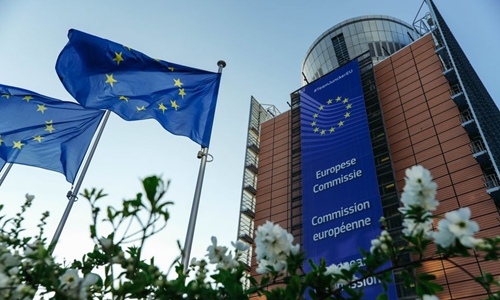Talks pave way for China-EU investment treaty
By Zhang Han and Wang Cong Source:Global Times Published: 2020/6/9 23:58:40
Europe ‘pragmatic’ as it navigates through China-US confrontations

This photo shows the Berlaymont Building, the European Commission headquarters, in Brussels, Belgium. (Xinhua/Zhang Cheng)
The 10th round of China-EU high level strategic dialogue was held on Tuesday where the two sides discussed bilateral relations and matters of shared interest, which analysts believe will pave the way for the China-EU Summit and an investment treaty, setting the tone for pragmatic cooperation as Europe carefully navigates through China-US confrontations.
Chinese State Councilor and Foreign Minister Wang Yi spoke with EU High Representative for Foreign Affairs and Security Policy Josep Borrell through a videoconference, with one item top on the agenda - trade and investment cooperation, which has been the cornerstone for the bilateral relationship.
Since the China-EU Summit was postponed due to the COVID-19 pandemic, analysts said the virtual dialogue will discuss the rescheduling of the event.
Wang pointed out at the conference that China and EU are not competitors but long-term strategic partners, and the two sides should stand on the progressive side of history, and stand with the majority of the international community to uphold multilateralism, according to the website of the Chinese foreign ministry.
Borrell echoed Wang that the EU and China both uphold multilateralism and will seek communication and cooperation instead of confrontation, and the EU respects the development path chosen by the Chinese people, and welcomes China to actively participate in international cooperation to solve global challenges.
Both sides also agreed to push for more positive outcomes through a successful China-EU summit. Wang discussed China's principle stance on Hong Kong affairs. Both sides also exchanged views on major international issues including the Iranian nuclear issue, the Korean Peninsula issue, and Middle East issues.
Sun Keqin, a research fellow at the China Institutes of Contemporary International Relations, said that unlike pessimistic reports from European media that the summit would be cancelled, he expects the summit to be rescheduled not too much later than the original date of September 13, unless the pandemic remains out of control by then. Discussion on completing a sweeping bilateral investment treaty by the end of the year was highlighted, and other topics like safeguarding multilateralism and cooperation in dealing with climate change were also discussed, analysts said.
"At a time when disputes are on the rise, preserving economic cooperation is particularly crucial to the stability of bilateral relations," said Bai Ming, a research fellow at the Chinese Academy of International Trade and Economic Cooperation. Bai noted that given the profound economic fallout from the COVID-19 pandemic, the need to complete the bilateral investment agreement that gives more access to investors on both sides is more important and urgent than ever, but there are "obstacles posed by the EU, making it hard to predict whether the deal would be completed by the end of the year."
The time framework to complete a sweeping bilateral investment treaty by the end of the year remained unchanged for the Chinese side after a 29th round of negotiations in late May. But on the EU side, officials were reportedly considering tightening scrutiny of Chinese investment in the bloc, particularly from Chinese state-owned firms.
"In this regard, some EU countries are heavily influenced by the US. Such strict rules would pose a relatively large hurdle for Chinese investments," Bai said, noting that the EU should not backtrack based on previous consensus if it wants to push forward the deal.
The urgent need for both sides to walk out of the pandemic, the US drop out of WHO and the chaotic response to the contagion have added to chances of enhanced China-EU ties despite dissonance in using China as a scapegoat for the pandemic, excluding Huawei in 5G construction and following the US interference in the Hong Kong National Security Legislation, analysts said.
China and the EU are standing at a juncture when the latter was alienating from the US, trying not to fully join the US-led anti-China circle, but unlikely to stand with China either, given areas of conflict, analysts said.
The pandemic has driven some hard-hit European countries to blame China, but countries like Italy have expressed appreciation for China's help. The UK and Germany are also collaborating with China in vaccine development.
The ambivalence was also obvious in the UK's change of heart on Huawei's participation in its 5G blueprint.
Western bias, US pressure and geopolitics have pushed some countries to take a firm stance amid the Hong Kong National Security Legislation, but Germany has rejected sanctions on China. It had previously refused to join the US in besieging China on the G7 summit.
The White House was planning to withdraw 9,500 or 30 percent of US troops stationed in Germany, the Wall Street Journal reported. The move could further alienate the US and its traditional EU allies.
Song Luzheng, a Paris-based Chinese scholar and research fellow at the China Institute of Fudan University, told the Global Times that although Europe is alienating from the US at present, the situation could change if Democrats win the election.
But Song believes the anti-China sentiment on some Western media will not affect the foundation of China-Europe cooperation as Europe has a pragmatic approach toward China and officials prioritize national interest over ideology.
Posted in: DIPLOMACY